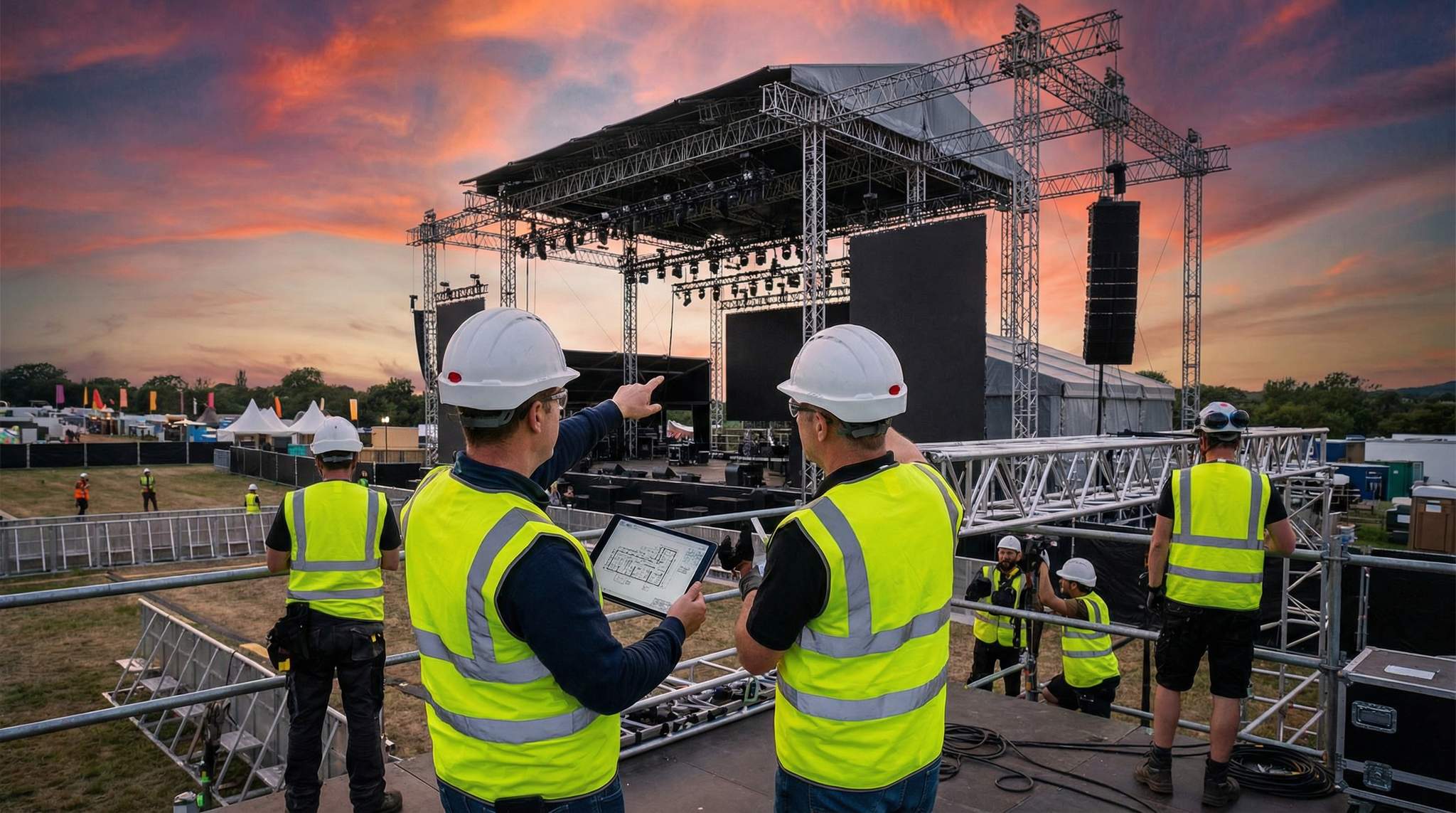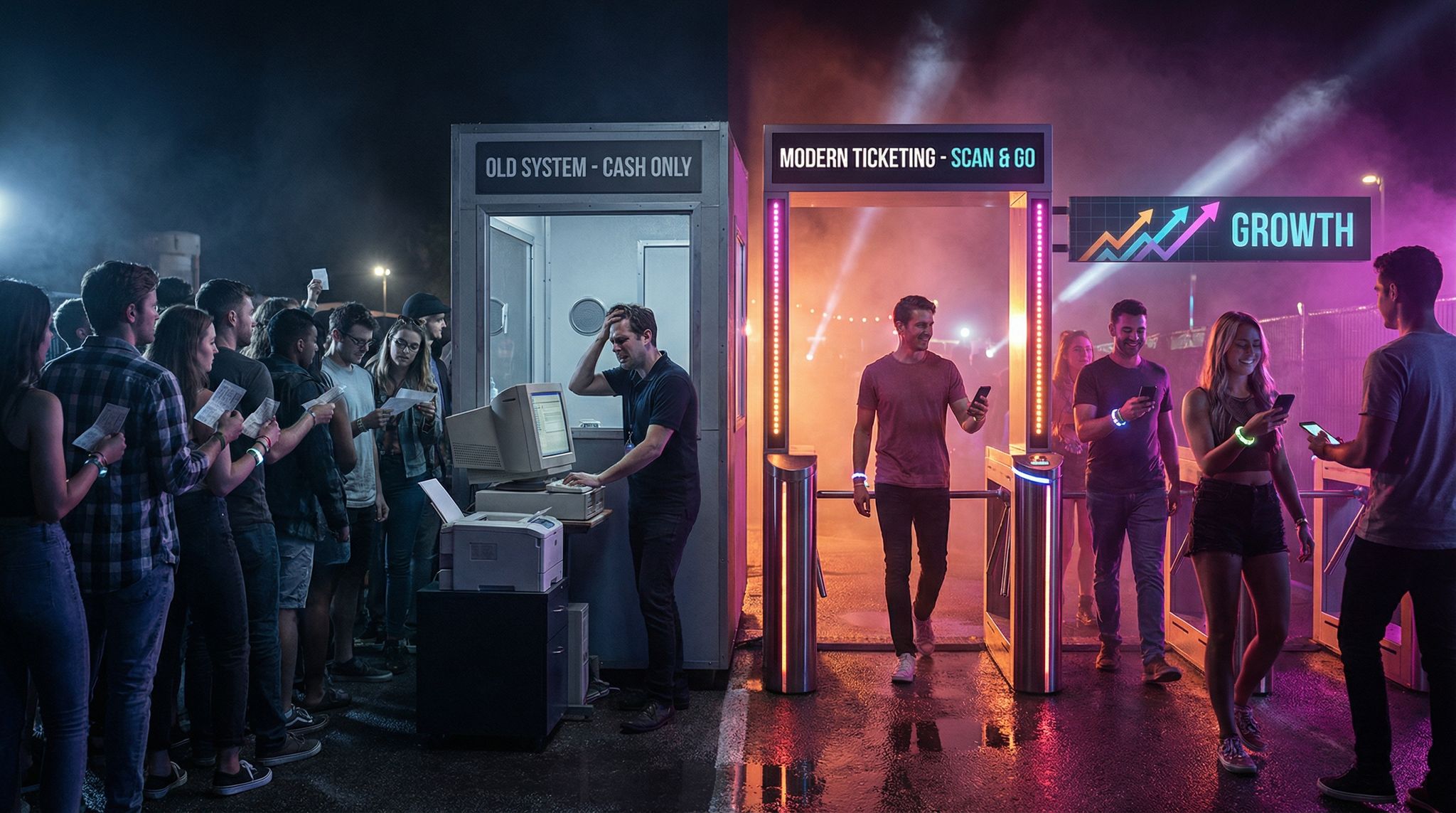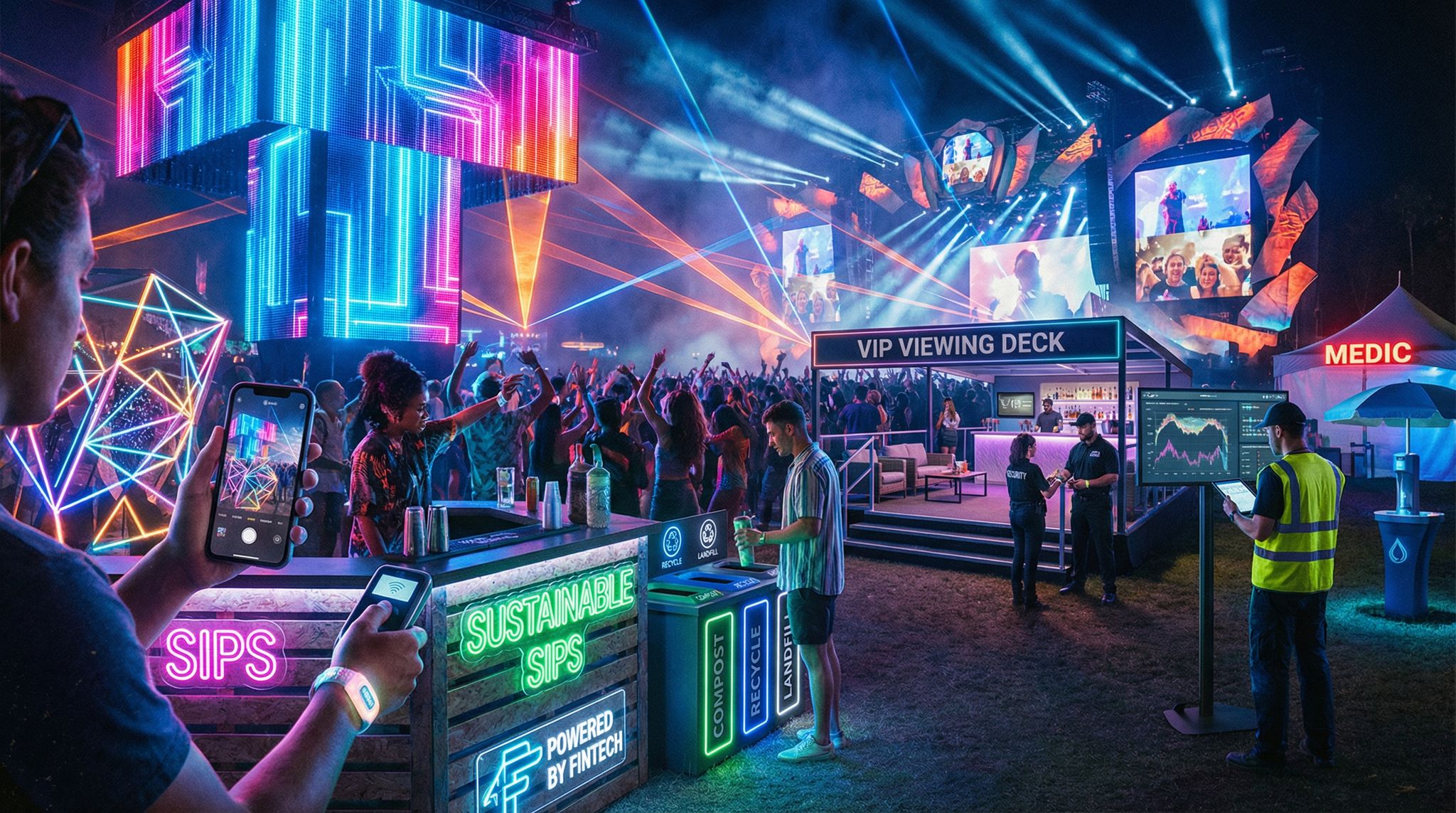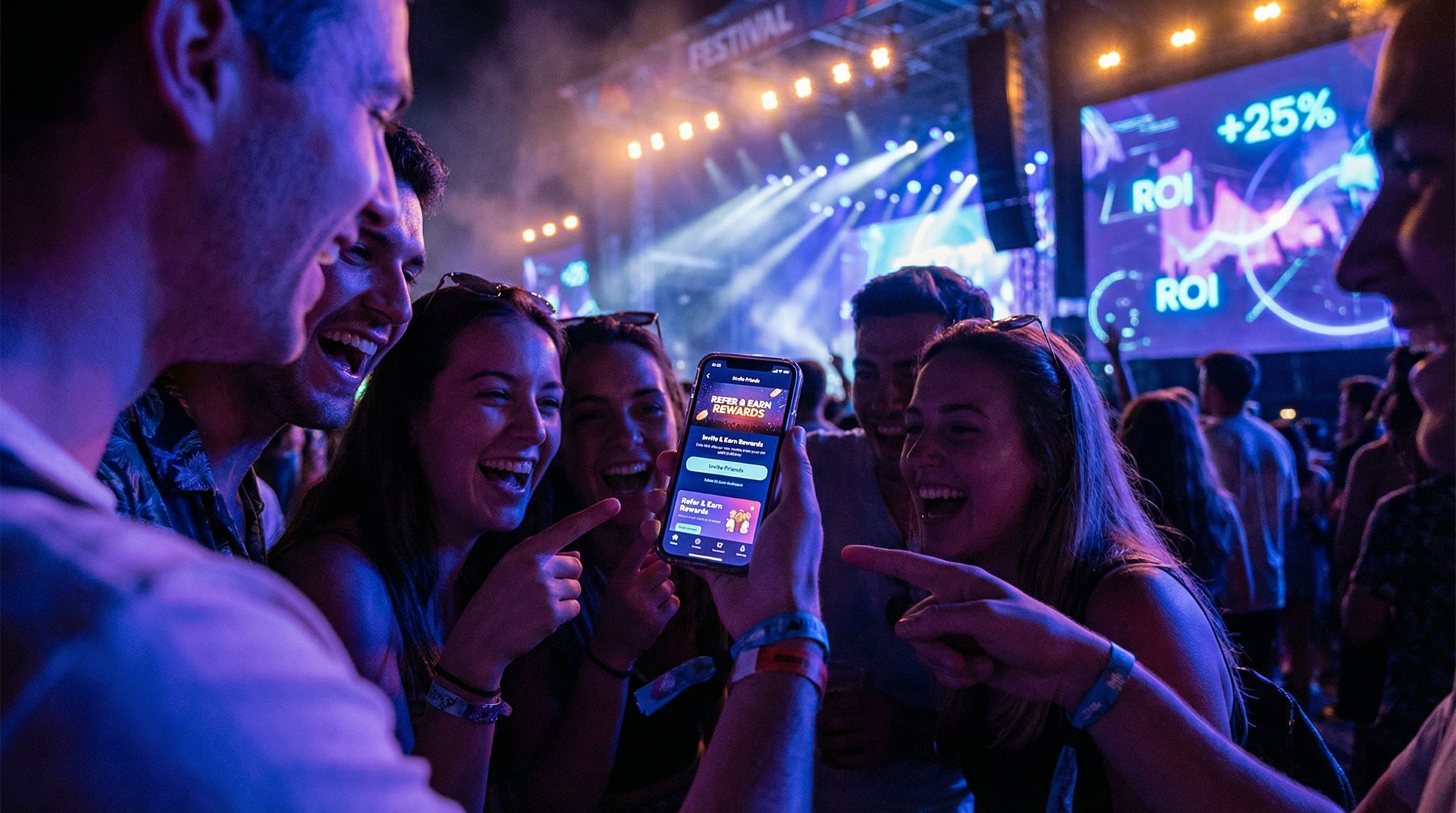Why External Safety and Technical Experts Matter
Festival production is a complex juggling act – but no one can be an expert at everything. Knowing your limits is a hallmark of a great festival organiser. Bringing in external safety and technical professionals at the right time can literally save lives and protect your event’s reputation. History has shown that when critical expertise is missing, things can go tragically wrong. From stage collapses at concerts to crowd surges at festivals like Astroworld in 2021, many disasters might have been averted with the guidance of seasoned specialists who understand preventing surges and keeping attendees safe.
On the flip side, festivals that invest in expert help have raised the bar for safety and production quality. By calling in structural engineers, crowd management consultants, fire safety officers, and other pros, you’re not admitting defeat – you’re preventing mistakes that could have costly or even fatal consequences. The world’s top festivals (Glastonbury, Tomorrowland, Coachella, and more) all have external experts working behind the scenes to ensure everything runs smoothly. The lesson is clear: Don’t wait for a crisis – bring in the right help before minor issues become major problems.
Scenarios Where You Should “Call in the Experts”
Certain festival scenarios are clear red flags that you need outside help. Here are some common situations where a prudent organiser will bring in external safety or technical professionals:
Complex Staging and Structures
If your festival features a massive stage, high platforms, or elaborate structures, involve a certified structural engineer or professional staging company early on. Temporary stages must withstand wind, weather, and the weight of heavy equipment and artists. For example, major festivals like Glastonbury (UK) and Rock in Rio (Brazil) work with experienced staging companies and engineers to design stages that can handle enormous loads safely. They get detailed engineering drawings, calculate load paths, and ensure every support tower and ballast is up to the task.
The importance of this was highlighted by tragic incidents: In 2012 a stage roof collapsed before a Radiohead concert in Toronto, killing a technician – investigators found the design was flawed and not built to spec, highlighting the importance of engineering and load paths in festival stages. Similarly, an inquiry into the Indiana State Fair collapse (2011) revealed the outdoor stage had inadequate lateral support, causing it to fail under a 70 mph gust, as detailed in the Indiana Fair Commission engineering report. These disasters underline a key point – never cut corners on stage safety. If you’re planning anything beyond a basic stage, hire a structural engineer to review and sign off the design. Have them work with the staging vendor to make sure every beam, truss and anchor is secure. It’s far cheaper than a collapse – in money and in lives.
Top-tier festivals follow this advice religiously. Belgium’s Tomorrowland festival, famous for its towering, fantastical stage designs, always partners with professional stage builders (like Stageco) and adheres strictly to engineer-approved plans, treating festival stages as complex engineering structures. This strict compliance has allowed Tomorrowland to wow crowds with elaborate themes each year without compromising safety. The takeaway: if your stages or installations are getting ambitious, bring in the experts who know how to keep them safe.
Planning a Festival?
Ticket Fairy's festival ticketing platform handles multi-day passes, RFID wristbands, and complex festival operations.
Massive Crowds and Crowd Dynamics
When you expect tens of thousands of people (or more) on site, basic security and intuition aren’t enough – you need a crowd management specialist. Crowd science is a field of its own, analyzing how people move and react in large numbers. History has taught us painful lessons about ignoring crowd dynamics. The 1979 WHO concert tragedy (Cincinnati, USA) and the 2010 Love Parade disaster (Duisburg, Germany) both saw fatal crowd crushes due to poor crowd flow design and oversight. More recently, at least 10 people died at Travis Scott’s Astroworld Festival in 2021 when the crowd surged and overwhelmed the event’s safety measures, a tragic example of why proper crowd management is essential for preventing surges. These incidents were not flukes – they were the result of improper planning and the absence of seasoned crowd-control expertise.
A crowd management professional (sometimes called a crowd dynamics consultant or crowd safety manager) can help map out your venue to avoid deadly bottlenecks. They’ll use tools like CAD diagrams and even simulation models to predict crowd densities. For example, they might redesign entry gates, add one-way flow routes, or suggest barrier configurations to prevent dangerous compressions near stages, utilizing strategies for preventing crowd surges and understanding the science behind crowd dynamics. Festivals learned this after tragedies like the Roskilde Festival in Denmark, where nine young men were trampled to death in 2000 during a Pearl Jam performance. In that case, the festival subsequently overhauled its front-of-stage barrier setup and crowd monitoring, and even shared lessons with peers like Glastonbury, as reported in coverage of the Roskilde inquiry and subsequent safety improvements at major festivals.
If your audience size or energy will be extreme – a general admission field with 100,000 excited fans, a dance music stage known for intense surges, etc. – don’t hesitate to call a crowd management expert. Look for specialists who have planned large sports or music events, and listen to their recommendations about layout, staffing of stewards, emergency exits, and show-stop procedures. Give them the authority to pause performances if things get unsafe. (At an Oasis stadium concert in 2005, a hired crowd-safety coordinator did exactly that – halting the show when a “tsunami” surge pushed a barrier, preventing injuries.) The experts’ goal isn’t to kill the vibe; it’s to keep the magic going without anyone getting killed.
Unique Safety Challenges (Pyro, Weather, and More)
Each festival has its own unique risks, and sometimes you need a technical specialist to tackle those. Planning a fireworks or pyrotechnics display? Bring in a licensed pyrotechnician and fire safety officer. They will obtain the proper permits, calculate safety distances, and coordinate with local fire authorities. Festivals from Australia to Singapore know better than to handle pyrotechnics in-house – they hire pros to avoid horrific accidents like stage fires. (One example: a stage at Tomorrowland’s sister event in Spain caught fire in 2017 due to a technical fault, but thankfully the professional crew evacuated everyone safely. It was a reminder of how crucial expert-led emergency planning is when using special effects.)
Weather is another unpredictable danger. If your event is outdoors, especially in an area prone to storms, consult a meteorologist or weather monitoring service. High winds, lightning, or extreme heat can turn a festival into a disaster if you’re unprepared. In 2011, a sudden storm at Pukkelpop Festival in Belgium brought down a stage, causing multiple fatalities, as documented in reports on stage collapses at European music festivals. Now many large festivals have lightning protocols and real-time weather alerts. Some U.S. festivals even hire private meteorologists to advise when to pause shows and clear the site due to approaching storms. Don’t assume you can just check a weather app – an expert can interpret radar, set thresholds for action, and help you develop severe weather plans (from sheltering procedures to full evacuations). When the sky turns threatening, you’ll be glad to have an expert voice in your ear.
Other niche scenarios include festivals in unusual locations. If you’re doing a festival on a beach or cruise ship, consult maritime safety experts and coast guards for water safety and evacuation plans. If your festival is in a remote desert or mountain, talk to wilderness safety consultants or local emergency services about on-site medical needs, wildlife, and environmental hazards. For instance, Burning Man (Nevada, USA) takes place in a harsh desert – they employ environmental safety teams to manage dust storms, dehydration risks, and even emergency airlifts. Likewise, events in dense urban settings might engage traffic engineers and crowd control experts to manage city streets and public transport loads. The rule of thumb: when your site presents challenges beyond the ordinary, bring in someone who has tackled those challenges before.
Need Festival Funding?
Get the capital you need to book headliners, secure venues, and scale your festival production.
Rapid Growth or New Territory
Perhaps your festival is scaling up rapidly – say, from 5,000 attendees last year to 20,000+ this year – or you’re expanding to a new country or city with different regulations. These are prime times to seek external help. Scaling up isn’t just about booking bigger acts; it means rethinking infrastructure, safety, and logistics on a new level. If your team’s experience has only been with smaller events, hire advisors who’ve run larger festivals to guide crowd flow, communications, and emergency planning for a bigger scale. Even seasoned festival teams bring in consultants when entering unknown territory. For example, when overseas festivals launch editions in new regions, they often fly in experts from the original team and combine them with local experts to navigate local laws, culture, and safety norms.
Don’t let pride or budget fears stop you here. Expanding too quickly without expert input can lead to catastrophe. (The infamous Fyre Festival in 2017 is a case study in overambition without expertise – a luxury festival was promised, but with no experienced production lead, the event quickly descended into disaster, leaving Ja Rule heartbroken after the Fyre Festival collapse.) On the positive side, look at a festival like Glastonbury: after a chaotic overcrowding issue in 2000 when its fence lines were overrun, the organisers brought in top security consultants and spent millions on a new “super-fence” to regain control, a move that secured Glastonbury’s future license. Michael Eavis, Glastonbury’s founder, even consulted with peers at Denmark’s Roskilde Festival to learn their best safety practices after Roskilde’s tragic 2000 incident, leading to tighter security measures and new fencing. As a result, Glastonbury not only secured its license to continue, but has had two decades of safer events. The lesson is that investing in expert help during periods of change or growth is an investment in your festival’s longevity.
Deciding When to Hire External Consultants
How do you know for sure that it’s time to call in outside help? Here are some practical criteria festival producers can use:
- Complexity beyond your team’s expertise: If an element of your festival (stage design, electrical systems, crowd size, etc.) introduces complexity that your in-house team has never managed, bring in a specialist. Don’t wait for a first-time failure.
- Legal or regulatory requirements: Many jurisdictions require certified professionals for certain tasks. For example, large temporary structures may need a structural engineer’s approval, or a crowd of X size may legally mandate a certified crowd manager. If the law requires it, comply – and even if not required, it’s often wise if your insurer or stakeholders expect it.
- Signs of potential danger in plans: Do a thorough risk assessment. If you identify a high-risk scenario (like “potential crowd crush at exit” or “stage roof near wind limit”), that’s a flashing red light to get an expert evaluation. An external expert can validate your plans or point out issues you overlooked.
- Your festival is evolving or growing: As mentioned, scaling up capacity, moving to a new type of venue, or adding new features (e.g. carnival rides, fireworks, camping) are all triggers to seek outside advice. Past success doesn’t guarantee safety under new conditions.
- Gut feeling or team consensus: Sometimes your staff or partners might voice concerns (“Are we sure this structure is safe?” or “Do we really know how to handle 50,000 people?”). Listen to those instincts. It’s far better to ask for help than to bluff through uncertainty when so much is at stake.
- When in doubt, err on the side of caution: If you’re on the fence about whether you need an expert, it probably means you do. The cost of hiring a consultant for a few days is negligible compared to the cost of a serious incident or a failed festival.
Integrating External Pros into Your Team
Bringing in an outside expert isn’t a “set and forget” deal – you need to integrate them effectively into your festival planning and operations. Here are some tips to make the collaboration smooth and productive:
1. Involve them early: Don’t wait until the last minute when a problem is already spiraling. Engage your structural engineer or safety consultant as early as possible in the planning phase. Early input means they can help shape the plan, not just fix issues later (when it might be too late or too expensive to change course).
2. Define roles and authority: Be clear about the expert’s responsibilities and decision-making power. If you hire a crowd safety manager, make it known to your team (and artists, if necessary) that this person has the authority to halt a performance or divert crowds if a safety threshold is breached. Establishing this hierarchy beforehand prevents confusion during critical moments.
3. Encourage collaboration: Have the external pros work closely with your internal team and vendors. For instance, let your structural engineer meet with the staging company and production crew to review plans together. Encourage your crowd management consultant to train your security staff in crowd monitoring techniques. Treat the consultants as teachers and collaborators – your whole team should learn from their expertise so that everyone is on the same page.
4. Integrate into emergency planning: Your external experts should be part of crafting the emergency action plans. They will bring ideas for scenarios you might not anticipate. Run tabletop exercises or simulations with them: e.g., “What if we need to evacuate Stage 2 due to weather?” and let them lead the discussion on roles, routes, and communication. This way, if an emergency arises, your team and the experts act as a unified command.
5. Maintain communication during the event: Set up a communication channel (radio or command center) where the experts can directly reach festival leadership throughout the event. The structural engineer might be tracking wind speeds at the stage, the crowd expert watching CCTV for density issues – you need their updates in real time. Make sure they have a seat in the event control room or safety center.
6. Support their recommendations: Crucially, when an expert you hired gives a recommendation – take it seriously. If the meteorologist says “evacuate now due to lightning risk,” or the structural inspector says “do not open gates until we secure that rigging,” then back them up fully. It can be hard to pause a show or spend extra money on last-minute fixes, but that’s why you brought them in. Trust their expertise, especially in high-pressure situations. One saved life (or avoided lawsuit) will vindicate that tough call.
By weaving external specialists into your operations, you create a safety net for your festival. Your team should not feel undermined by outsiders; rather, frame it as an extension of the team. It’s like having a seasoned mentor alongside you, ensuring you don’t repeat others’ mistakes. Over time, your internal crew will also become more skilled by learning from these pros.
Success Stories: The Payoff of Professional Help
Still on the fence about calling in outside help? Consider a few success stories and lessons learned:
-
Tomorrowland (Belgium): By investing heavily in top engineers and technical teams, Tomorrowland built a record of spectacular stages with no major structural incidents. In 2022, when a sudden fire destroyed one of their massive stages just days before opening, their partnership with an expert staging contractor meant a new stage was erected within 36 hours. The festival went on almost uninterrupted – a triumph of professional expertise and contingency planning.
-
Glastonbury (UK): After learning hard lessons in 2000, Glastonbury’s organisers transformed their approach. With expert security advisors and new safety infrastructure, they eliminated the once-rampant fence-jumping and dramatically improved crowd safety. The festival’s ability to run safely despite muddy weather or huge crowds is a testament to heeding expert advice and working hand-in-hand with local authorities on everything from traffic management to medical provision.
-
Local Festivals leveling up: It’s not just giant festivals – even smaller events benefit from external experts. In New Zealand, the boutique festival Rhythm and Vines grew from a few thousand attendees to over 20,000. The organisers brought in an experienced safety consultant to redesign their site layout and entry system once crowds grew. The result was smoother entry lines, happier locals (no more traffic jams), and safer camping areas. The investment paid off with incident rates dropping even as the attendance climbed.
-
Tragedies that prompted change: Sadly, many safety regulations in our industry are “written in blood” – they came about after a disaster. The key is to learn from those without having to suffer one yourself. After the stage collapse at Indiana State Fair and a similar fatal collapse at a Canadian Radiohead show, North American festivals began rigorously enforcing engineering sign-offs for stages and not letting budget or time pressures shortcut those reviews. Likewise, crowd management standards (like the ANSI ES1.9-2020 in the U.S.) were developed so that organisers have clearer guidance on managing large crowds. Progressive festival promoters embrace these standards and often invite experts to audit their event plans against best practices.
In all these cases, the common thread is that seeking expert help early saved the organisers from far worse outcomes. A consultant’s fee is a drop in the bucket compared to an event cancellation, a stage rebuild, or legal liabilities from an injury. Beyond that, it protects the very thing that matters most: the people – your fans, staff, and artists.





